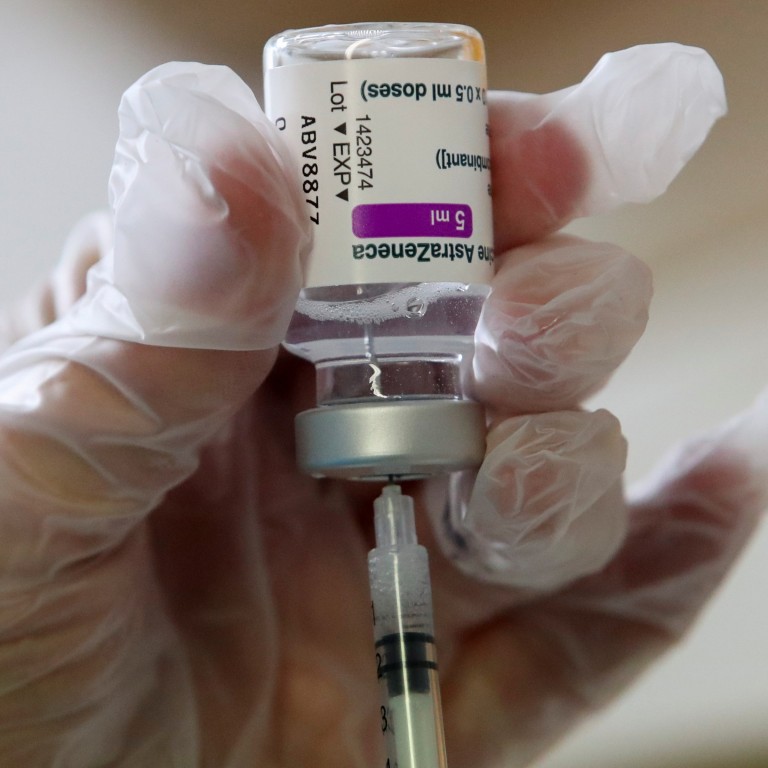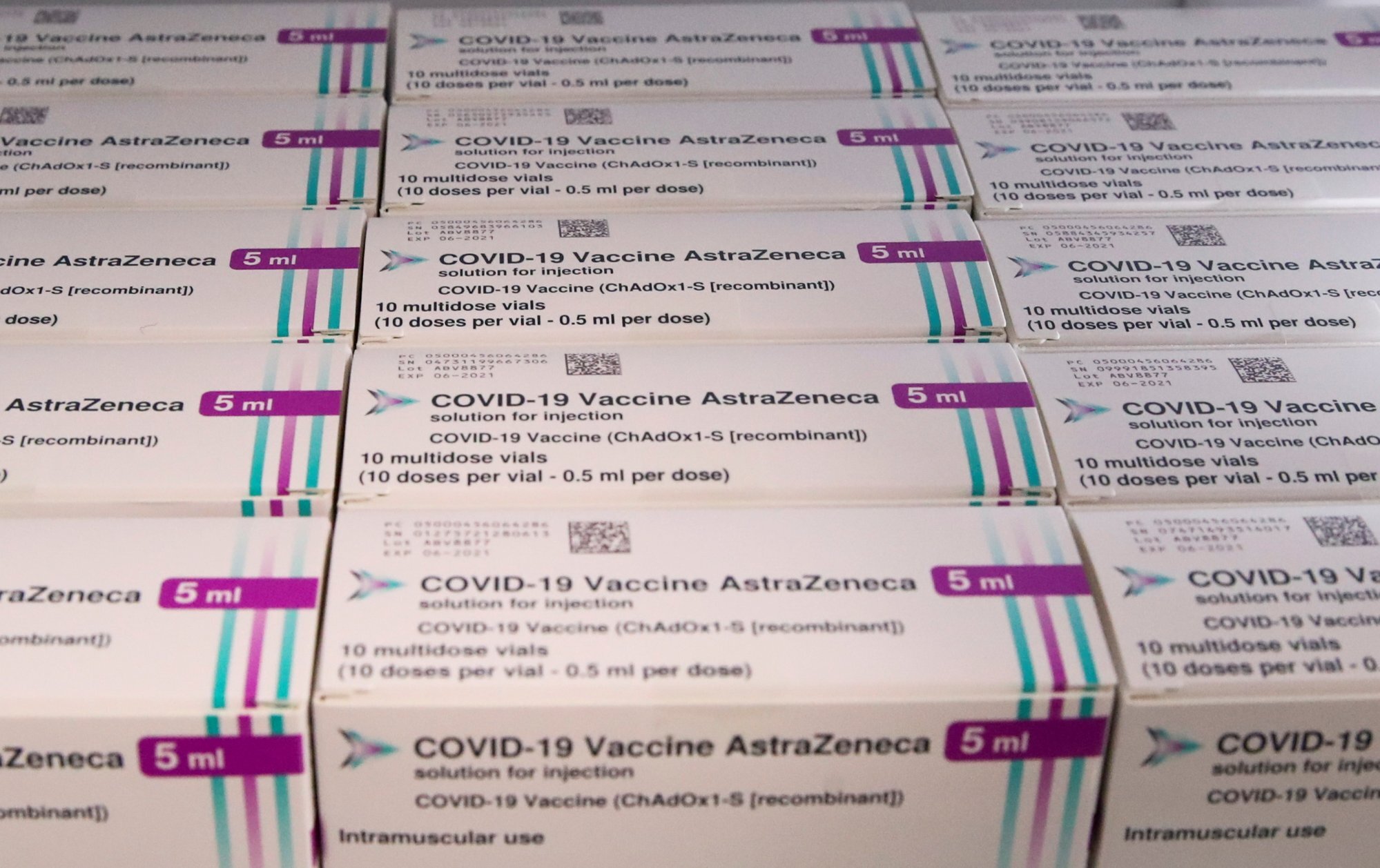
Coronavirus: vaccine experts urge Hong Kong government to scrap order for 7.5 million AstraZeneca jabs over mounting safety concerns
- Experts suggest the government cancel its orders for 7.5 million AstraZeneca shots and replace them with second-generation vaccines offering better protection against mutated strains
- European Medicines Agency said an investigation concluded that ‘unusual blood clots with low blood platelets should be listed as very rare side effects’ of the vaccine
Leading expert Professor David Hui Shu-cheong and Executive Council member Dr Lam Ching-choi suggested on Wednesday that the government dump its orders for 7.5 million AstraZeneca shots and replace them with second-generation vaccines offering better protection against mutated coronavirus strains.
But while several European countries have suspended their roll-outs of the vaccine for younger people following dozens of reports linking it to blood clots, the Hong Kong government had little to add after a statement on Tuesday night that the Food and Health Bureau was in contact with the manufacturer to request “relevant information on safety”.
On Wednesday, the government said confidentiality agreements prevented it from disclosing information on individual vaccines but it would “closely monitor” information released by drug regulatory authorities elsewhere. A bureau spokeswoman could not confirm or deny whether the government had paid a deposit to the drug giant, or if an exit clause existed in the agreement in the event of major side effects or defects, to allow Hong Kong to get a refund.
The European Medicines Agency (EMA) said on Wednesday evening (Hong Kong time) an investigation concluded that “unusual blood clots with low blood platelets should be listed as very rare side effects”.
“The reported combination of blood clots and low blood platelets is very rare, and the overall benefits of the vaccine in preventing Covid-19 outweigh the risks of side effects,” the EMA said.
Agencies for foreign domestic workers reject Philippines flight ban calls
Concerns over the vaccine came as Hong Kong authorities confirmed eight new Covid-19 cases on Wednesday, six of which were imported. The two local cases were untraceable.
Two infections were imported from India, two from Pakistan and the Philippines and Egypt each accounted for one. More than 10 preliminary-positive cases were also recorded, most of them imported.
The city’s case tally stood at 11,539, with 205 related deaths. Some 178 patients were infected with variants that had the “N501Y” mutation first seen in Britain and South Africa.
In a separate development, an expert committee evaluating reports of 15 deaths following Covid-19 jabs – that of 11 males and four females, aged between 55 and 80 – found that most died of cardiovascular diseases and there was no causal relationship with the vaccination. It had already concluded there was no causal relationship in three of the reports.
“The medical history and/or preliminary autopsy findings of 11 cases showed that the outcomes of the deceased persons were not directly associated with Covid-19 vaccination and the remaining case had a history of vaccination 25 days before passing away,” a health department statement said.

Hong Kong struck deals to buy 22.5 million doses of vaccines, with 7.5 million shots each coming from three suppliers: AstraZeneca, which developed its Covid-19 jab with Oxford University; Chinese firm Sinovac Biotech; and Fosun Pharma, agent for the jab jointly developed by Germany’s BioNTech and US firm Pfizer.
The city’s inoculation drive, which started in February, is based on a twin-vaccine approach using shots from BioNTech and Sinovac. Each vaccine requires two doses to achieve immunity.
The government previously estimated the AstraZeneca shots would arrive in the city in the second half of the year, but Hui, a respiratory medicine expert at Chinese University, said the firm had still not applied for emergency use of the jab in Hong Kong.
Asked whether he thought the government should stop its procurement of the vaccine, Hui said: “You can put it this way. It’s efficacy rate is OK … but we have to consider its effectiveness on mutated virus strains and possible blood clot problems recently, so we don’t have to rush.”
He said although AstraZeneca vaccines had an efficacy rate of about 70 per cent for non-mutated strains, the figure was only about 10 per cent for the South African variant.
“Rather, officials can start paying attention to whether there are other vaccines which can cover the mutated virus strains, or even if some second-generation vaccines will emerge later. It won’t be too late even if we buy more vaccines at that time,” he said.
Exco member Lam, who echoed Hui’s views in halting Hong Kong’s order with AstraZeneca, said he believed “some money was involved”, adding standard contracts would involve “various scenarios” in case of product defects.
South Korea considers vaccine export curbs to secure local supply
Lam also believed Hong Kong should wait and see which manufacturer could come up with second-generation vaccines that could best protect against Covid-19 mutations, in solid phase-three trials of recipients.
Professor Ho Pak-leung, a microbiologist from the University of Hong Kong, noted the supply of vaccines in the city was still bigger than demand even without the AstraZeneca jabs.
“If residents can have a choice on which vaccines they can take and if the government can make sure the supply is stable, then in case it is proved that there is a causality, it may be worth Hong Kong considering not buying the vaccines.”

